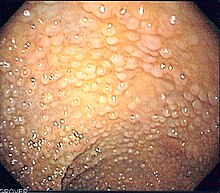Polyposis
| Classification according to ICD-10 | |
|---|---|
| D12.6 | Benign neoplasm of the colon, unspecified |
| J33.1 | Polyposis nasalis deformans |
| J33.8 | Other sinus polyps |
| J33.9 | Nasal polyp, unspecified |
| ICD-10 online (WHO version 2019) | |
The polyposis ( Greek πολύπωσις ) is the medical term for the occurrence of numerous polyps in a hollow organ .
Diseases with multiple (usually more than a hundred) polyps in the gastrointestinal tract are grouped under the designation polyposis gastrointestinalis . Symptoms such as bleeding, diarrhea or constipation ( constipation ), as well as abdominal pain or colic may indicate the presence of polyposis gastrointestinalis. By endoscopic examinations , coupled with the removal of tissue samples ( biopsies ), can be diagnosed and a polyposis colorectal cancers , ulcers or diverticulitis delimit. X-ray contrast displays by taking an X-ray contrast medium play a subordinate role today.
If the polyps occur in the uterus , it is called polyposis uteri . It can also cause bleeding from the uterus.
Mucosal growths in the paranasal sinuses , which can obstruct their ducts into the nose, are known as polyposis nasi et sinuum . In this context, real polyps are meant here as tumors and not the adenoid vegetations, technically incorrectly referred to as “polyps” .
See also
- familial adenomatous polyposis
- juvenile polyposis
- Peutz-Jeghers Syndrome
- Nasal polyp
- Cronkhite Canada Syndrome
- Polymerase Proofreading Associated Polyposis (PPAP) - a newly discovered form of polyposis
